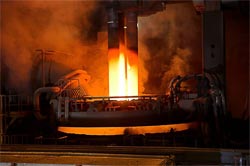Contact-free measurement of the liquid steel temperature increases productivity of electric arc furnaces

Simetal RCB Temp from Siemens offers operators of electric arc furnaces (EAF) a precise, contact-free method to measure steel bath temperatures.<br>
Simetal RCB Temp from Siemens VAI Metals Technologies offers operators of electric arc furnaces (EAF) a precise, contact-free method to measure steel bath temperatures. At the heart of Simetal RCB Temp is the Siemens Refining Combined Burner (RCB) system equipped with an optical sensor and analyzing unit.
In contrast to conventional processes, the temperature can be measured at short intervals, so the best time to tap can be determined more exactly. As a result, power-on and power-off times are reduced for an increase in the EAF’s overall productivity. Measurement cartridges are also no longer required, further lowering operating costs. Simetal RCB Temp also improves operator safety by eliminating potentially hazardous work near the furnace.
Steel production in an EAF depends heavily on temperature control. Precise and reliable temperature measurements are required, especially before tapping the steel in the ladle. Measurements are usually taken through the open slag door, either manually or with manipulators fitted with conventional cartridges. Both processes are strenuous and hazardous for operating personnel, and restrict the number of measurements that can be made during steel refining. Furthermore, imprecise measurements and process disturbances have to be taken into account.
The new Simetal RCB Temp temperature measurement system is based on the proven Siemens RCB technology. The system consists of a burner with an integrated lance, which injects oxygen into the liquid steel bath via a supersonic jet. After preheating and cutting the scrap with the burner’s powerful flame, the lance mode is used to decarburize the molten steel. In order to measure the steel bath temperature, a measuring gas is blown in instead of oxygen. An optical sensor integrated into the back end of the lance picks up the measuring signal. This measuring signal is amplified and further processed in an analyzing unit. The temperature is then calculated by means of an algorithm specially developed by Siemens VAI.
Simetal RCB Temp allows precise measurement of the temperature at short intervals during power on and with a closed door. The measuring process can be initiated manually from the control room or automatically in HMI programs. The steel temperature increase is monitored and the EAF process is stopped without delays when the aimed tapping temperature is reached.
Integrating the temperature measurement into the RCB system also has a number of other advantages. Moving parts are no longer required. The position of the sensors at the back end of the RCB prevents the sensors from being damaged during charging, and the thermal stress on the sensors is insignificant. The furnace door remains closed, keeping cold air out. The furnace remains under electrical power and the necessary foaming slag process is not interrupted. Since measurement cartridges are not needed, operating costs are also reduced. Fitting or retrofitting Simetal RCB Temp does not take long and can be carried out easily during a planned maintenance shutdown.
Further information about solutions for steelworks, rolling mills and processing lines can be found under: http://www.siemens.com/metals
The Siemens Industry Sector (Erlangen, Germany) is the worldwide leading supplier of environmentally friendly production, transportation, building and lighting technologies. With integrated automation technologies and comprehensive industry-specific solutions, Siemens increases the productivity, efficiency and flexibility of its customers in the fields of industry and infrastructure. The Sector consists of six divisions: Building Technologies, Drive Technologies, Industry Automation, Industry Solutions, Mobility und Osram. With around 207,000 employees worldwide (September 30), Siemens Industry achieved in fiscal year 2009 total sales of approximately €35 billion.
The Siemens Industry Solutions Division (Erlangen, Germany) is one of the world's leading solution and service providers for industrial and infrastructure facilities comprising the business activities of Siemens VAI Metals Technologies, Water Technologies and Industrial Technologies. Activities include engineering and installation, operation and service for the entire life cycle. A wide-ranging portfolio of environmental solutions helps industrial companies to use energy, water and equipment efficiently, reduce emissions and comply with environmental guidelines. With around 31,000 employees worldwide (September 30), Siemens Industry Solutions posted sales of €6.8 billion in fiscal year 2009.
Media Contact
All latest news from the category: Process Engineering
This special field revolves around processes for modifying material properties (milling, cooling), composition (filtration, distillation) and type (oxidation, hydration).
Valuable information is available on a broad range of technologies including material separation, laser processes, measuring techniques and robot engineering in addition to testing methods and coating and materials analysis processes.
Newest articles

Recharging the Future: Batteries Built for Extreme Cold Using Negative Thermal Expansion
Most solids expand as temperatures increase and shrink as they cool. Some materials do the opposite, expanding in the cold. Lithium titanium phosphate is one such substance and could provide…

Self-Destructing Cancer Cells: Cutting-Edge RNA Breakthrough
Jülich scientists use novel RNA technology to selectively switch off tumours in the brain. An Adaptable Platform Technology That Destroys Glioblastoma Cancer Cells Using a special RNA molecule, a team…

Endurance Training: Transforming Lives of Heart Failure Patients
Can strength and endurance training be beneficial for patients with a certain form of heart failure? A research team from Greifswald investigated this question together with seven other research centers…



